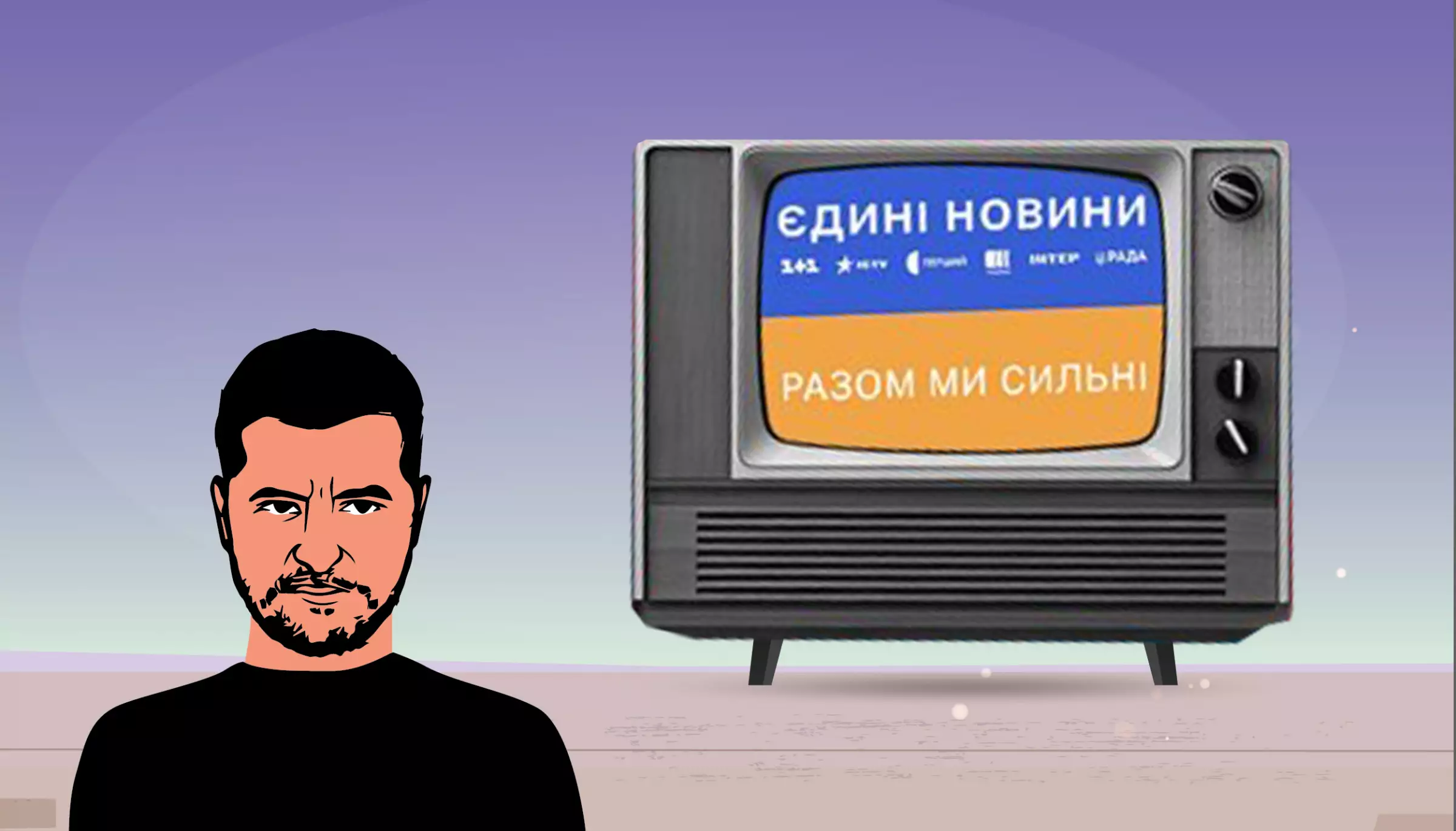Українською читайте тут.
The authorities squeezed the United News marathon so hard that they crushed it.
In 2019, when Servant of the People came to power, the party had no media outlets of its own. Detector Media described a situation where the president’s team felt like outsiders on all the talk shows: opponents always outnumbered them, and the hosts leaned towards the interests of the channels’ owners. Even 1+1 served the interests of Kolomoiskyi more than those of the government.
Today, the President’s Office wields more media influence than any previous administration, having effectively “appropriated” state media (thanks to the Rada TV channel reform), created new channels (Dim TV channel), placed allies in key positions (Ukrinform, although not everything went as planned, and Oleksii Matsuka stepped down from his leadership role), and consolidated oligarchic platforms through the United News marathon. President Zelenskyy’s team achieved this reach through bold moves but now lacks the skill and restraint needed to utilize it effectively. Instead, they are exhausting the fertile ground they’ve acquired, ultimately harming both themselves and Ukraine as a whole.
The most straightforward example is the marathon itself — a useful idea, a worthy project that, however, was used to attack Poroshenko just three months after its launch. Now, the marathon periodically targets Klitschko in Kyiv. The government could have stopped at uniting the country’s largest channels and manipulating their broadcasts. But the President’s Office went further: without explanation, they removed channels belonging to Poroshenko and his ally Knyazhytskyi from the digital airwaves. It appears that European Solidarity is now barred from being invited to the marathon’s guest studios, as evidenced by the five “independent” channels that have refrained from inviting them since May 2022 — except for the truly independent Suspilne, which eventually felt compelled to withdraw from the marathon.
In contrast, members of Servant of the People are invited over a hundred times each month, while all other parties combined receive roughly the same level of airtime as the de facto spokesperson for the President’s Office, Mykhailo Podolyak (15 times per month).
The insatiable appetite extends even to the topics the marathon censors. Our analyst Ihor Kulyas compiled a list for the third quarter of this year, showing that viewers of the five “independent” channels didn’t hear about, for example, the bribery allegations against MP Zadoroizhnyi from Servant of the People, the dismissal of Ukrenergo supervisory board members due to political pressure, a survey by the Razumkov Center on Ukrainians’ quality of life, or a KIIS poll on trust in the authorities.
The United News guest studios aren’t a place for true debate. This is likely because political decisions are typically commented on by Servant of the People representatives or Cabinet of Ministers members. Or, it happens like this (from Ihor Kulyas’s monitoring notes):
“Rada channel on the Victory Plan: ‘...There were many journalistic evaluations, calling it a “historic speech”’ [...] The expert discussion included only Oleksandr Musiyenko, head of the Center for Military-Law Researches. As usual, opponents of the government weren’t given a voice.
Meanwhile, Suspilne on the Victory Plan: ‘The discussion was valuable, partly because all three MPs were present simultaneously, so they had a full opportunity to oppose each other if necessary [...] The discussion involved six (!) experts.’”
It’s a bit of unhelpful advice, but recall how oligarch-owned channels once operated. Representatives of Svoboda were most frequently invited by pro-Russian trash media, which portrayed them as Nazis. Now, one of the few places where you can see a Servant of the People and European Solidarity member debating is on Pryamyi. After all, audiences love their spectacles, and hosts love their punching bags.
The President’s Office has so thoroughly taken over the marathon that it seems no one else needs it anymore. The marathon’s viewership is dropping, fewer people trust it, and many see it as irrelevant. Reporters Without Borders and the European Federation of Journalists are calling for its closure. The U.S. Department of State referenced it in a human rights report under freedom of speech concerns. The European Commission, in its report, criticized the marathon, questioning both the necessity of budget funding and its objectivity. They also urged Ukraine to “work on restoring a pluralistic media landscape.”
Imagine having, potentially, the most powerful media resource in Ukraine’s history in your hands, only to hold on so tightly that it gets crushed. Yet Servant of the People repeats this approach across its entire media strategy.
Not long ago, Ukrinform was Ukraine’s largest news agency and a member of the White List of top-quality Ukrainian online media. Then Oleksii Matsuka, a media manager affiliated with the President’s Office, took charge, only to be dismissed six months later. By then, however, Ukrinform had fallen off the quality media list and caught the attention of G7 ambassadors. Thanks to Ukrainska Pravda, the story is now widely known: Matsuka had circulated talking points, Ukrinform saw a 60% increase in news mentions about Andriy Yermak, and lists of “undesirable” speakers emerged, which included not only opposition politicians but also “local residents who have been without water supply for a long time” and “combat veterans unable to secure aid due to personal organizational issues.”
The use of Ukrinform’s resources has been as refined as if the President’s Office had raided a golden egg factory, with Oleksii Matsuka slaughtering all the hens for meat with a chainsaw. And, incidentally, this isn’t his first “successful” foray into media.
Long before they had a media network of their own, the President’s Office launched Dim, ostensibly a broadcast channel for the occupied territories. Later, following the start of the full-scale invasion, FreeDom was introduced as Ukraine’s outreach to Russia. Both were once headed by Oleksii Matsuka. However, to the government’s credit, these platforms have yet to be overtly used for self-promotion. Their issue lies elsewhere: no one really understands why they exist. The former has transformed into a Ukrainian-language channel “aimed at Ukrainian refugees abroad,” producing entertainment and educational content in Ukrainian, while the latter serves as a platform for the Russian opposition, broadcasting in Russian.
Another government-controlled source operates in secret — though not exactly a well-kept one. Vertykal, an anonymous Telegram channel, is the most conspicuous outlet aligned with the President’s Office. It lavishes praise on Yermak: “Yermak nailed it, dude, you’re the man.” It attacks Poroshenko: “Petro Poroshenko planned a coup and tried to involve Zaluzhnyi.” Occasionally, it even accuses Ukrainian military personnel of violating international humanitarian law, though, supposedly, as a form of “compliment.”
It’s challenging to assess how effectively Vertykal and other such “anonymous” channels controlled by Zelenskyy’s team influence Ukrainians. But one can certainly say that Vertykal’s manipulations are as subtle as jokes on Kvartal 95. The channel literally posts images of Zelenskyy and Yermak captioned, “Based.”
The government’s relationship with media it doesn’t control also resembles elephants in a china shop.
From his very first record-breaking press marathon, Zelenskyy took an adversarial stance toward journalists. At his latest press conference, he went so far as to accuse Ukrainska Pravda of working from a script in response to a critical question: “It’s like you have a playbook. I thought we left that behind with Yanukovych. What’s it called… temnyks?” Once again, it’s difficult to gauge whether Zelenskyy “won” this exchange with the average voter, but he certainly alienated a majority of key opinion leaders.
From words to action: When investigative journalist Yurii Nikolov called the president a “draft dodger” on air, “unknown persons” visited him at home. Other “unknown persons” — Telegram channels associated with the President’s Office — published posts targeting Nikolov. This well-thought-out, strategic move from Zelenskyy’s supporters resulted in a public outcry against the government and a criminal investigation.
Almost simultaneously with this visit to Nikolov, let’s say “someone” launched a media attack on the Bihus.info investigative team — leaking a video showing crew members using drugs. Presumably, the masterminds behind this hoped to discredit the journalists, but they failed to consider that this would reveal surveillance on the media. The best investigative journalists in Ukraine just traced the filming back to the SBU Department for the Protection of National Statehood, which, undoubtedly, acted independently, without orders from above.
This ham-fisted approach by certain elements within the Ukrainian government didn’t result in a victory over the media. Instead, it led to journalists being invited to meet with the G7 ambassadors.
The President’s Office’s media policy exemplifies the adage about absolute power corrupting absolutely. In the wake of the full-scale invasion, with all levers of control in hand, Zelenskyy’s team unilaterally cut opposition channels from the digital airwaves, united oligarchic television channels into a single entity, blocked access to it for their opponents and took over Ukrinform and got so carried away that destroyed its credibility. And both directly and via outsourcing, they’re now attacking Ukraine’s top journalists.
Such tactics provided short-term gains for many Ukrainian administrations in the past yet ultimately led them to a bad end. Ukrainians sense and disdain authoritarianism — especially of the more crude variety. But let Zelenskyy’s team worry about their political future. The bigger concern is how these approaches harm Ukraine’s media landscape.
The lifeboat that is the United News, useful to all participants at the start of the full-scale invasion, is now dragging them down toward the bottom. Television may suffer long-term damage from the marathon, as people lose the habit of watching TV altogether. News is available, regrettably, on Telegram; quality journalism is found in online media; talk shows reside in places such as Ukrainska Pravda’s YouTube channel. Will the traditional channels survive this extended period of irrelevance and lost trust?
How much time and effort will it take to restore Ukrinform’s credibility? And will we ever be able to wean Ukrainians off relying on Telegram as their primary news source? After all, this trend was originally set in motion by the Ukrainian authorities with their Dark Knight [anonymous political Telegram channel] and other such Jokers. And it’s a tool the Russians have eagerly seized upon — Telegram channels for Ukrainian cities were literally part of their occupation strategy. This legitimization of anonymous Telegram channels may well represent the greatest blow to collective media literacy in Ukraine’s history.
The authorities aren’t just legitimizing these trash media outlets; they’re also, on the other hand, attacking some of the best investigative journalists. In the context of war, this behavior goes beyond being undemocratic — it’s harmful. As Ukraine relies on foreign economic assistance and faces the need to raise taxes, it would be more beneficial to support those uncovering the “17-hryvnia eggs” [reference to a Defense Ministry procurement scandal] within the system. In the face of Russian information warfare, supporting credible sources of information also seems like something that could genuinely help.
It’s time for change. For shutting down the marathon. For reforming international broadcasting. For shutting down government-controlled trash Telegram channels — not by passing new laws, but simply by stopping the support and cooperation that keep them running. For opening access to media to all political actors. For allowing journalists should to work without interference. After all, if the truth scares you, the problem isn’t that others might find it out.
Collage by Nataliya Lobach



